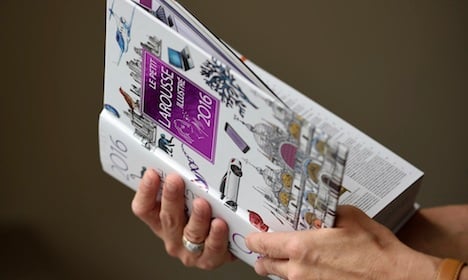Arty, émoticône and mook are just three of the new words that native English speakers may recognise from their own language in the latest edition of the famous French dictionary.
The arrival of yet more English words in the French language will suit many Anglophone learners of French, who love to use the old trick of saying an English word in a French accent when they get stuck.
Perhaps given France's wealth of culture it is not surprising that a word like arty – used in the same context as it would be in English, has been accepted into the dictionary, although you'd have thought the French would have already had their own version.
The emergence of words troll and émoticône reflect the inescapable impact of social media and new ways of communication.
![]() (A look at a few “émoticônes”. Photo: Sebastians Deckers, Flickr)
(A look at a few “émoticônes”. Photo: Sebastians Deckers, Flickr)
Troll has the same meaning as its English counterpart, which specifically describes an internet user who incites conflict on the with provocative comments in social forums. The word comes in verb form too, with troller (meaning “to troll”).
Émoticône, which only differs from the English ‘emoticon’ by the accents and the final ‘e’, describes the digital icons of smiley faces that you can choose to accompany messages on your smartphone.
The French have been using English portmanteaus for many years. For example “brunch” has made it onto menus in fashionable French restaurants.
However, the latest is mook, which has trickled into French conversation and has now been made official in the dictionary. This is a merging of English words “magazine” and “book”.
La fanfiction has also been given the green light by Le Petit Larousse, which explains it as a “feminine noun composed of fan and fiction, a narrative that has been written by a fan on the internet, following a pre-existing fiction, manga, series, movie or video game”.
Rétrofuturisme is another word that was added, a term which describes depictions of the future produced in an earlier era. The word comes directly from the English word.
Similarly, the term spin-off was pinched from English too.
The French also added a few new words that appear to be translations of English, for example a “one-man-show”, which had until recently been adopted, has now been added to the dictionary as seul en scène.
Other words that have entered the French dictionary reflect recent events and changing eating habits.
Europhobe is now an official word as is complotiste or conspiracy theorist in English. These complotistes were all over French social media in the aftermath of the attacks.
Economie collaborative which is “sharing economy” in English is also a new entry, as is “covoiturer” which is carpooling.
There are also plenty of new foods entering into the dictionary suggesting French eating habits are changing.
There was yuzu, a lemon cake from Japan, the Vietnamese soup Pho, a wrap as well as burrata cheese and ciabatta.
As well as new nouns and verbs, 50 new personalities have also been added to the proper noun section, including British Formula 1 racer Lewis Hamilton and British comedy legends The Monty Python.
 (Lewis Hamilton is just one of the names added to the dictionary. Photo: David Wall, Flickr)
(Lewis Hamilton is just one of the names added to the dictionary. Photo: David Wall, Flickr)
Le Petit Larousse is traditionally the bestseller at the time of la rentrée (the period when the French go back to school in September) and this year it will appear in bookshops from May 26th so French students will be able to be fully prepared for the academic year ahead.
The edition will celebrate the bicentenary of dictionary's founder Pierre Larousse, who was born in 1817.
We wonder what Monsieur Larousse would have made of all these modern anglicized invasions into his work.
By Hattie Ditton




 Please whitelist us to continue reading.
Please whitelist us to continue reading.
Member comments